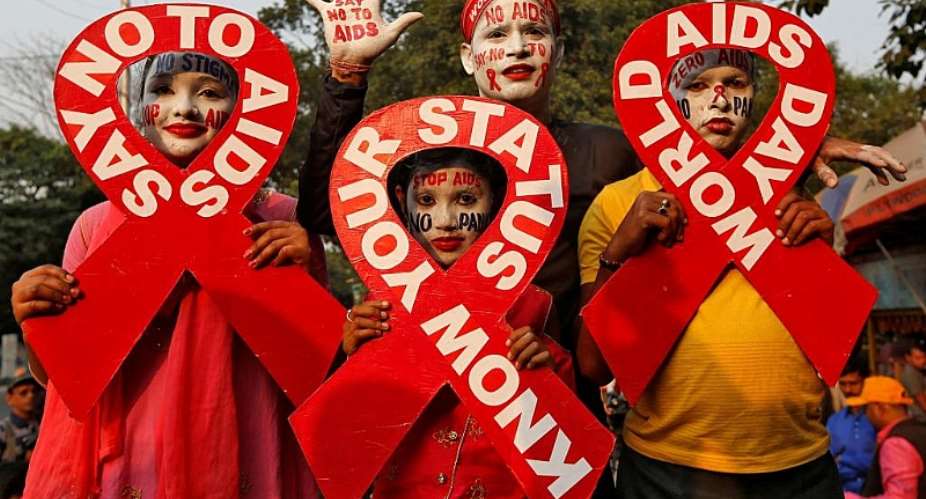As events are staged on Sunday 1 December to mark World Aids Day, reports paint a dramatically different picture of the futures of those carrying the HIV virus, depending on where they live.
Earlier this week, South Africa said it was introducing an affordable, cutting-edge drug to fight HIV in the country with the largest number of people living with the Aids-causing virus.
Hailing the new anti-retroviral drug as "the fastest way to reduce HIV viral load", the health department said it will start rolling out the advanced pill known as TLD on December 1, World Aids day.
Health Minister Zweli Mkhize unveiled the pioneering drug at a ceremony in southwestern KwaZulu-Natal, the province with the country's highest prevalence rates, where more than a quarter of the population is infected.
The new three-in-one pill, developed with the financial backing of global health development organisation Unitaid, bands together a cocktail of drugs, including dolutegravir. Dolutegravir is the preferred first-line and second-line treatment recommended by the World Health Organization, and already the drug of choice in high-income countries.
Unitaid's director of operations Robert Matiru said the new TLD drug "is highly effective and has much more rapid viral suppression" than the current treatment regime. It has fewer side effects, and is cheaper.
Spanish researchers fight disease with disease
Spanish doctors have, meanwhile made an exceptional discovery that could revolutionise research.
“We discovered that 50 people from one family had a genetic mutation that caused a muscular disease,” says Alcami Pertejo, head of research at the National Centre for Immunology and Microbiology. “But this defect also protects them from being infected with HIV.”
The mutation, a form of muscular dystrophy affecting the limbs, affects a gene which plays a role in transporting the HIV virus inside cells. “If we manage to find a drug that can reproduce that blocking effect, we could stop someone from being infected with the virus,” Pertejo explains.
Roughly 150,000 people are infected with HIV in Spain.
Infections and deaths increase in Venezuela
In Venezuela, the humanitarian crisis has led to a shortage of anti-retroviral drugs and provoked an increase in the number of Aids-related deaths and HIV infections, a specialist says.
An HIV/Aids specialist, Mario Comegna says around 120,000 people in Venezuela are HIV-positive. That's less than 1 percent of the population and the country's humanitarian crisis has hit them particularly hard. Even if there are no official figures, there's been a marked increase in Aids-related deaths.
"It is difficult to get accurate data because there is still discrimination,” Comegna says. “The reports of patients who die of Aids-related illnesses often don't mention they were positive. So, the data is scarce, but it is clear that an irregular supply of medicine increases the mortality rate."
Around $14 billion has been pledged by governments, businesses and philanthropists for the fight against Aids, tuberculosis and malaria over the next three years.
Most of the money is destined for the African continent, where millions of people have died as a result of these epidemics.





 SSNIT must be managed without gov’t interference – Austin Gamey
SSNIT must be managed without gov’t interference – Austin Gamey
 Ejisu by-election could go either way between NPP and independent candidate — Gl...
Ejisu by-election could go either way between NPP and independent candidate — Gl...
 We never asked ministers, DCEs to bring NPP apparatchiks for returning officer r...
We never asked ministers, DCEs to bring NPP apparatchiks for returning officer r...
 No one denigrated the commission when you appointed NDC sympathizers during your...
No one denigrated the commission when you appointed NDC sympathizers during your...
 Used cloth dealers protests over delayed Kumasi Central Market project
Used cloth dealers protests over delayed Kumasi Central Market project
 A/R: Kwadaso onion market traders refuse to relocate to new site
A/R: Kwadaso onion market traders refuse to relocate to new site
 Dumsor: Corn mill operators at Kaneshie market face financial crisis
Dumsor: Corn mill operators at Kaneshie market face financial crisis
 Jamestown fishermen seek support over destruction of canoes by Tuesday's heavy d...
Jamestown fishermen seek support over destruction of canoes by Tuesday's heavy d...
 Election 2024: EC to commence voter registration exercise on May 7
Election 2024: EC to commence voter registration exercise on May 7
 Public schools rebranding: We’re switching to blue and white, we’re painting all...
Public schools rebranding: We’re switching to blue and white, we’re painting all...
